| Srl | Item |
| 1 |
ID:
133692
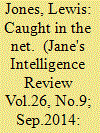

|
|
|
|
|
| Publication |
2014.
|
| Summary/Abstract |
Although the risk of conflict over fisheries stocks in the South Pacific is currently low, increasing demand will test existing conversation measures. Lewis Jones examines the potential for confrontations and China seeks to play a larger role in Pacific Fishing.
|
|
|
|
|
|
|
|
|
|
|
|
|
|
|
|
| 2 |
ID:
131024


|
|
|
|
|
| Publication |
2014.
|
| Summary/Abstract |
In a March 2014 report, the United Nations human rights investigators con?rmed that chemical weapons were indeed used in Syria in 2013, which apparently came from the stockpiles of the Syrian military, whose chemical weapons stash reportedly included mustard gas. The report con?rmed that the deadly nerve agent Sarin was used in three separate incidents: the Damascus suburb ofal-Ghouta in August 2013, Khan al-Assal in March 2013 and Saraqeb near the northern town of ldlih in April 2013. While the Bashar al-Assad government and the Syrian opposition indict each other of using chemical weapons, which are strictly banned as per existing international law and convention, the incidents amount to being the deadliest chemical attacks the world has witnessed in almost a quarter of a century.
|
|
|
|
|
|
|
|
|
|
|
|
|
|
|
|
| 3 |
ID:
106299
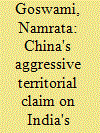

|
|
|
|
|
| Publication |
2011.
|
| Summary/Abstract |
The Chinese territorial claim on the Indian state of Arunachal Pradesh has negatively affected India-China relations for many decades now. In recent years, China has become visibly aggressive with regard to its territorial claim by denying visas to Indians from Arunachal Pradesh travelling to China, claiming that they are Chinese citizens and hence do not require visas. China also tried to block ADB aid sought by India for the state. The article argues that the recent Chinese aggressiveness is a response to India's rising power status in the Asian regional order; a space that China covets as its own sphere of influence. Hence, China is engaging in balancing against India through territorial aggression and military prowess that privileges power projection against peer competitors. India's counter strategy needs to factor Chinese intentions and not to 'under balance' against the Chinese threat in Arunachal Pradesh.
|
|
|
|
|
|
|
|
|
|
|
|
|
|
|
|
| 4 |
ID:
142463
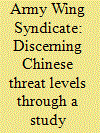

|
|
|
| 5 |
ID:
122343
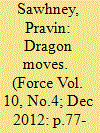

|
|
|
| 6 |
ID:
046901
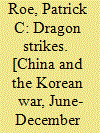

|
|
|
|
|
| Publication |
Novato, Presidio Press, Inc., 2000.
|
| Description |
xiv, 466p.hbk
|
| Standard Number |
0891417036
|
|
|
|
|
|
|
|
|
|
|
|
Copies: C:1/I:0,R:0,Q:0
Circulation
| Accession# | Call# | Current Location | Status | Policy | Location |
| 044100 | 951.9042/ROE 044100 | Main | On Shelf | General | |
|
|
|
|
| 7 |
ID:
095201
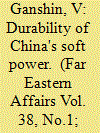

|
|
|
|
|
| Publication |
2010.
|
| Summary/Abstract |
After successfully hosting the Olympic Games, it seems as though China now finds itself in a new process of self-identification. With the proliferation of crisis situations globally, China's earlier status and weight in international affairs could hardly serve to strengthen its international positions. Meanwhile, Beijing states resolutely that it will never become a "superpower," and that its ascent and marshalling of might presents no threat whatsoever to other members of the world community. China intends to conquer its new heights by exclusively peaceful means, with the help of so-called soft power. To accomplish this, it is ready in the future to seek mutual understanding with other nations and peoples through increased cultural exchanges, promoting the attractiveness of its model of socioeconomic development, and convincing others of its sincerity.
|
|
|
|
|
|
|
|
|
|
|
|
|
|
|
|
| 8 |
ID:
131950


|
|
|
|
|
| Publication |
2014.
|
| Summary/Abstract |
In a novel approach to studying political mobilization among ethnic Tibetans in China, this article addresses two key questions. First, considering the Chinese state's repressive policies towards Tibetan Buddhism, what role does religion play in fomenting Tibetan political resistance? Second, what implications can be drawn from the changing ethnic demography in Tibet about the conflict behaviour of Tibetans? Using various GIS-referenced data, this article specifically examines the 2008 Tibetan protest movements in China. The main results of our analysis indicate that the spread and frequency of protests in ethnic Tibetan areas are significantly associated with the number of officially registered Tibetan Buddhist sites, as well as the historical dominance of particular types of Tibetan religious sects. Furthermore, our analysis shows that the effect of Han Chinese settlement on Tibetan political activism is more controversial than previously though
|
|
|
|
|
|
|
|
|
|
|
|
|
|
|
|
| 9 |
ID:
129710
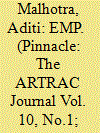

|
|
|
| 10 |
ID:
128531
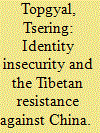

|
|
|
|
|
| Publication |
2013.
|
| Summary/Abstract |
This article re-examines the five-decade-old Tibetan struggle against Chinese rule, asking what drives this multifaceted resistance. It argues that identity insecurity has been at the heart of the Tibetan struggle, and takes a position against the problematic practice in both the academic literature and popular discourse of treating Chinese policies and practices as security-driven and the Tibetan struggle as motivated by ethno-nationalistic impulses. It charts the vigorous contestation within the Tibetan diaspora between those standing issue images_86_3_Topgyal_Tibet_03for complete independence and others who are satisfied with "greater autonomy" and examines the multifaceted resistance inside Tibet. It also recognizes the unifying effects of the widespread loyalty to the Dalai Lama and fears for the survival of the Tibetan identity. The article also examines the links between Tibet and its diaspora. All these themes are developed while demonstrating the security rationale behind the Tibetan struggle
|
|
|
|
|
|
|
|
|
|
|
|
|
|
|
|
| 11 |
ID:
122412
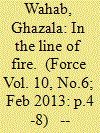

|
|
|
| 12 |
ID:
130887
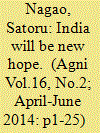

|
|
|
|
|
| Publication |
2014.
|
| Summary/Abstract |
A key ponderable that emerges while reviewing recent happenings is the fast progression of Japan-India relations. What are the reasons for this phenomenon?. The Japanese emperor's visit to India in November 2013 was the first ever such vision in history. January 2014 was the first time for a Japanese prime minister to grace the Indian Republic day parade as the chief guest.
|
|
|
|
|
|
|
|
|
|
|
|
|
|
|
|
| 13 |
ID:
106383
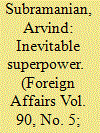

|
|
|
|
|
| Publication |
2011.
|
| Summary/Abstract |
Is China poised to take over from the United States as the world's leading economy? Yes, judging by its GDP, trade flows, and ability to act as a creditor to the rest of the world. In fact, China's economic dominance will be far greater and come about far sooner than most observers realize.
|
|
|
|
|
|
|
|
|
|
|
|
|
|
|
|
| 14 |
ID:
128429
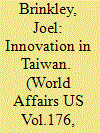

|
|
|
|
|
| Publication |
2014.
|
| Summary/Abstract |
Taiwan's president, Ma Ying-jeou, sat in a low leather chair looking out over the vast presidential conference room of his Taipei office. On the wall behind him hung a portrait of Sun Yat-sen, the Chinese icon who is credited with the revolution a century ago that ended two thousand years of imperial rule. Under Ma's feet lay a light blue carpet festooned with white representations of ocean waves. Overhead, white cloth, styled like ship sails, covered the ceiling lights-all of it intended to represent Taiwan's journey away from mainland China. Asian conference rooms are unlike those in the West. There's no mahogany conference table. Instead, plush chairs are arranged in a U shape. And the conference leader, in this case President Ma, sits at the center with his conferees to his left and right-university professors, think tank leaders, and government officials from Asia and the West who were there for a conference on the East China Sea debate between Taiwan, China, and Japan.
|
|
|
|
|
|
|
|
|
|
|
|
|
|
|
|
| 15 |
ID:
128631


|
|
|
|
|
| Publication |
2013.
|
| Summary/Abstract |
As the fulcrum of economic growth tilts towards the dynamic eastern economies in the 21st century, the Indian Ocean Region (IOR) has assumed strategic importance. China is making inroads in to the IOR island states with tis weiqi strategy to safeguard and further its interest with its realpolitik of the string of pearls. The author is Vise President of the Indian Maritime foundation and a former DNI and DNO at NHQ as well as author of A Nation and its Navy at War
|
|
|
|
|
|
|
|
|
|
|
|
|
|
|
|
| 16 |
ID:
115501
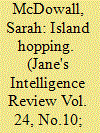

|
|
|
| 17 |
ID:
117180
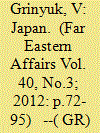

|
|
|
| 18 |
ID:
128660
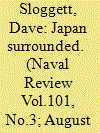

|
|
|
|
|
| Publication |
2013.
|
| Summary/Abstract |
Today Japan faces a myriad of military threats. How it is responding to those through the deployment of naval forces provides a model for other states in the region.
|
|
|
|
|
|
|
|
|
|
|
|
|
|
|
|
| 19 |
ID:
131422
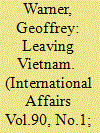

|
|
|
|
|
| Publication |
2014.
|
| Summary/Abstract |
Although anticipated, the North Vietnamese 'Easter offensive' against South Vietnam in 1972 created problems for the United States. Having reached a rapprochement with Communist China, President Nixon and his foreign policy adviser, Henry Kissinger, believed that the attack could have serious repercussions for their attempt to balance it with détente with the Soviet Union, not to mention the US's credibility as a Great Power. They also feared it would damage Nixon's prospects for re-election in November 1972. Despite opposition from his Defense Secretary, Nixon renewed the bombing of North Vietnam which had been stopped by President Johnson in 1968. This helped to bring the North Vietnamese back to the conference table and after complex negotiations, a draft peace agreement was ready for initialling in October 1972. However, President Thieu of South Vietnam saw significant drawbacks in the agreement and refused to go along with it. The North Vietnamese chose to have one more attempt to win on the battlefield and President Nixon, who had scaled down the bombing when peace seemed closer and won a landslide victory in the presidential election, launched another eleven days of concentrated bombing raids on North Vietnam at the turn of the year. This led to the final agreement initialled on 23 January 1973, which President Thieu reluctantly acceded to. Thieu's reservations were justified, but Nixon realized that, despite his electoral victory, he could not count on the continued support of Congress and the American people for the war. Far from bringing 'peace with honor in Vietnam and Southeast Asia', the January agreement was a fig leaf to cover American withdrawal.
|
|
|
|
|
|
|
|
|
|
|
|
|
|
|
|
| 20 |
ID:
155398
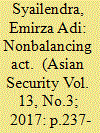

|
|
|
|
|
| Summary/Abstract |
Indonesia faces an increasing maritime threat from China. Incursions of China’s maritime law enforcement forces protecting Chinese ships fishing illegally in Indonesia’s Exclusive Economic Zone pose a threat to President Joko Widodo’s goal of transforming Indonesia into a Global Maritime Fulcrum. China’s actions generate the prediction that Indonesia should balance against China, but this has not occurred. Instead, bureaucratic politics and President Jokowi’s interest in securing Chinese financial support for his ambitious infrastructure projects have prevented the adoption of a more assertive balancing policy. Using Schweller’s argument that threats go unanswered when there is disagreement among key domestic actors, this article argues that a lack of elite consensus in Indonesia is impeding the adoption of a balancing policy. Instead, Indonesia is continuing its traditional policy of nonbalancing.
|
|
|
|
|
|
|
|
|
|
|
|
|
|
|
|